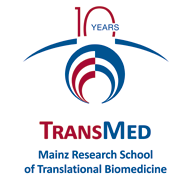Upcoming Events
Below you will find all upcoming events, such as talks, transferable skills courses, or lab courses.
All listed events carry a number of TransMed credit points corresponding to the time of attendance. 0.1 TransMed credit point is equivalent to 45 minutes of attendance.

Talk: Dietmar Zehn: "Subsets and T cell differentiation in chronic LCMV infection"
Synopsis of his talk:
Failure to clear an infection can coincide with the appearance of T cells which express low amounts of cytokines and high levels of inhibitory receptors (PD-1, Lag-3, Tim-3). This phenotype has so far been viewed to mark exhausted and terminally differentiated effector cells. Nonetheless, “exhausted” T cell populations in chronic infections and tumors are long-living and can be expanded upon blocking inhibitory receptor ligand systems. This raised the questions how these populations are maintained and which mechanisms act in case of therapeutically induced re-expansion.
We and others identified recently that both long-term T cell maintenance in chronic infections and re-expansion following blockade of PD-1 signaling are depending on a small subpopulation of T cells, which express the transcription factor Tcf-1. We showed that Tcf-1 positive T cells share key features with conventional memory T cells while they co-express markers of “exhausted T cells” (i.e. PD-1). These memory-like T cells are capable of undergoing self-renewal while they are continuously generating terminally differentiated effector cells. Given the presumed central role of the memory-like population for therapeutic purposes, we will report recent advances on molecules and mechanisms that control size and function of this subset.
Zehn lab scientific focus
Dietmar Zehn’s scientific interests concentrate on basic and translational research in molecular and cellular immunology applied to malignant tumours and infectious diseases. Following up on the notion that immune self-tolerance mechanisms fail to eliminate T cells that weakly interact with self- or tumorantigens, Dr. Zehn´s research aims to reveal and test novel strategies for utilizing such cells to eradicate tumours. Using a newly developed research model and a systematic approach he studies which mechanisms normally curtail the tumour-damaging potential of these cells and he investigates how the restrictions applying to such cells can be overcome. Furthermore, he focuses on determining cellular and molecular mechanisms controlling T cell expansion and the generation of effector and memory T cells in acute infections and CD8+ T cell exhaustion during chronic immune responses.
Short bio Dietmar Zehn
Born in 1976, Dietmar Zehn earned a MD/PhD degree from the Humboldt University in Berlin in 2004, for having published papers on the antigen presenting capacity of dendritic cells. In the same year, he became a post-doctoral fellow of Michael J. Bevan in the Department of Immunology at the University of Washington in Seattle, USA. There he investigated how the affinity of T cell receptors (TCR) for self- and foreign-peptide MHC-complexes impacts T cell responses. His key findings are that central and peripheral tolerance routinely fail to eliminate low affinity autoimmune T cells and that even very low affinity TCR and peptide-MHC interactions are sufficient to generate effector and memory T cells. His excellent expertise in the fields of immunology of infectious diseases, immunological self-tolerance, and cellular immunology has led to important scientific contributions.
For more information on the work of Dietmar Zehn please visit his websites at CHUV about Immune tolerance, T cell differentiation and effector and memory t cell differentiation.
His publication list can be viewed following this link.
| Datum | 15.03.2018 |
|---|---|
| Uhrzeit | 17:00 Uhr |
| Ort | Building 708, big lecture room, University Medical Center |
| Fortbildungspunkte | 0,1 CP TransMed |
| Dozent | Professor Dr. Dietmar Zehn Division of Animal Physiology and Immunology School of Life Sciences Weihenstephan Technical University of Munich Germany |
| Sonstiges | |


 International Medical Services
International Medical Services
